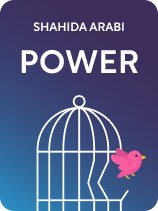

This article is an excerpt from the Shortform book guide to "Power" by Shahida Arabi. Shortform has the world's best summaries and analyses of books you should be reading.
Like this article? Sign up for a free trial here.
Have you been feeling down in the dumps lately? What are activities that activate your feel-good brain chemicals?
Recovering from a relationship with a narcissist can bring up all sorts of negative feelings that just won’t go away. With the help of Power by Shahida Arabi, you can find enjoyable hobbies and activities that pinpoint brain chemicals that make you happy.
Let’s take a look at what you can do to stimulate certain brain chemicals.
Healthy Activities That Stimulate Feel-Good Brain Chemicals
Arabi recommends seeking out healthy activities that will stimulate the release of feel-good brain chemicals such as oxytocin, dopamine, adrenaline, and serotonin. This strategy is helpful because you may experience withdrawal from these chemicals after leaving a narcissistic partner, and these activities replace your biochemical addiction to the narcissist with safer activities that you’re in control of.
(Shortform note: Although substance use (including drugs and alcohol) may also provide temporary relief and a sense of control to victims and survivors of abuse, experts assert that it’s an unsafe way to cope with symptoms of trauma. This is because substance use exacerbates mental illness (like PTSD and depression), lowers self-esteem, and can cause additional health and financial problems that would hinder progress toward healing. In addition, abusers often weaponize substances by fostering an addiction in their victims that can be used to further control them.)
Oxytocin is a hormone that’s released from bonding with people through some kind of physical intimacy. Arabi says that if you associate oxytocin with a narcissist ex-partner, it’s helpful to find new ways to boost oxytocin such as cuddling with animals or other loved ones, hugging yourself, dating casually, and spending time with trusted friends. (Shortform: Some researchers add that oxytocin contributes to psychological stability, trust, and relaxation—functions that are all important for healing after abuse. Other ways of boosting oxytocin are by singing in a group and exercising.)
Dopamine is a neurotransmitter that makes us feel happy—a chemical you may have previously received from intermittent kindness from a narcissistic partner in between the emotional abuse.
Adrenaline is a hormone produced as a fear response (which you may have gotten from the constant fear that your narcissistic partner would lash out at you), and it also has an antidepressant effect.
Arabi says that instead of getting your fill of these chemicals from an ex-partner, you can find new sources by trying new, scary activities like extreme sports, traveling to a new country, or going on a roller coaster. Doing things spontaneously will also increase the rush of pleasure you get from trying something new.
(Shortform note: While Arabi focuses on fulfilling your need for these feel-good chemicals for healing purposes, others warn against falling into the trap of compulsively seeking out these kinds of neurochemicals to your own detriment. For example, in Dopamine Nation, Anna Lembke explains how to take back control of your behavior when the desire for dopamine leads you to overindulge in things like social media and junk food. This suggests that an element of moderation may also be an important aspect of finding new sources of dopamine and adrenaline.)
Serotonin is another hormone that stabilizes your mood and self-esteem, and Arabi writes that low levels of serotonin can cause you to mentally fixate on your ex-partner. She recommends increasing your serotonin levels by spending time in the sunlight, taking B-vitamin supplements, getting massages, focusing on happy memories, exercising, and taking medications that can be prescribed by a mental health professional.
(Shortform note: Research shows that serotonin also encourages prosocial behavior (like not wanting to harm others) and reduces aggression, which may explain why serotonin-modulating medications are used to treat symptoms of NPD.)

———End of Preview———
Like what you just read? Read the rest of the world's best book summary and analysis of Shahida Arabi's "Power" at Shortform.
Here's what you'll find in our full Power summary:
- A look at the severe condition called Narcissistic Personality Disorder (NPD)
- How to avoid or end relationships with narcissists
- Advice for healing after narcissistic abuse






